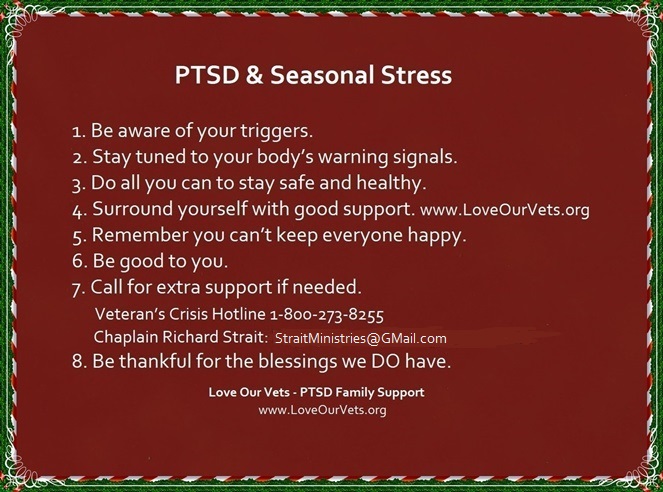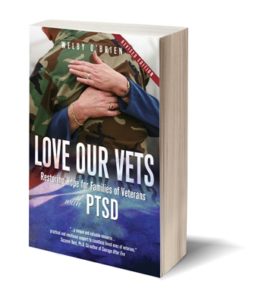Winter is off to a brutal start this year for many of us! And just the mention of the holidays and this season can send chills up our spines. Along with guilt because this should be “the most wonderful time of the year”… or so they say. Unfortunately, those who deal with the relentless demands of PTSD are especially vulnerable this time of year.
Stormy weather, darkness, cold, threatening power outages, holiday hooplahs, excessive special events, family stresses, increased financial pressures, trauma anniversaries, overloaded schedules, lack of exercise, more crowds, less space, emotional upheavals, etc…. None of which are helpful to PTSD survivors and their loved ones. So since we cannot fast-forward to spring, how do we best make it through these colder, darker, difficult days?
The following are some tips that have helped both me and my husband, a 100% disabled veteran with PTSD, during times of seasonal stress. Keep in mind that although secondarily impacted, we as loved ones are just as vulnerable to the triggers and effects as those with the PTSD.
1. Be aware of your triggers. What circumstances (and people) cause your PTSD symptoms to increase? Learn to recognize your symptoms as well as what triggers them. Some typical signs of triggering are flashbacks, avoidance, numbing, putting up walls, withdrawing, hyper-vigilance, irritability, easily startled, memory blocks, sudden bursts of anger or other emotions, difficulty sleeping, nightmares, fear, depression, anxiety, substance abuse and other addictive behaviors, difficulty holding a job, relationship problems, and unfortunately sometimes even suicidal thoughts.
2. Stay tuned to your body’s warning signals. Listen to your body. Learn to trust it. Does that headache, or indigestion, or grinding teeth mean anything? In order to survive, we need to be aware of our needs and be able to communicate them.
3. Do all you can to stay safe and healthy. Each of us is a choice maker. Although PTSD can be tyrannical at times, ultimately we have the power to choose what is best for us in the long run. Keeping our bodies feeling safe is crucial to surviving the PTSD onslaughts. And not giving in to destructive behaviors will pay off, not only for us but for those we love.
4. Surround yourself with good support. Who are the people who are helpful (not the leech type)? Reach out to others who are supportive. No one needs to be alone! If you have no support, please check our website for options of local groups, online support, and helpful resources. www.LoveOurVets.org
5. Remember you can’t keep everyone happy. Surprise! (I’m just now learning this!) Plan to disappoint a few people if necessary in order to save your own sanity. Do try, however, to be polite if possible. Learning to say “No, thank you” graciously comes with practice.
6. Be good to you. Take time to do what you need and want. This is no longer a luxury but a necessity. In the book LOVE OUR VETS: Restoring Hope for Families of Veterans with PTSD, the entire middle section is devoted to us as caregivers and loved ones in caring for our OWN needs. Do you even know what you really NEED? Perhaps a light box to perk up the dark days, your favorite music, a new winter activity/sport, tastier cuisine, afternoon naps, prayer, indoor exercise, a canine companion, etc. And don’t forget to pause during the chaos to give thanks for all the blessings you DO have. You are worth it!
7. Call for extra support if needed. Whether you are someone who battles PTSD or a loved one of someone who does, the courage to reach out for help when needed is truly admirable. The alternative is not the answer. Make a point to connect with your counselor or therapist during this time if you can. There are people waiting to talk with you 24/7 any time. No one can do this alone. Especially this time of year when things can feel so overwhelming!
1-800-273-8255 Veteran’s Crisis Hotline
Chaplain Rich and his wife Karen:
Rich 231-288-4222 Karen 231-288-7290
e-mail: StraitMinistries@GMail.com
There is no need to dread the days ahead. Stay connected with those who are good for you, and take care of YOU. One day, one moment at a time. It will be spring before you know it! (And then we will be probably be moaning about pulling weeds, mowing grass, and sunburn!)
Welby O’Brien is crazy about her Veteran husband, and together they face the daily challenges of PTSD. Holding a Master’s Degree in counseling from Portland State University and a teaching degree from Biola University, she has authored Goodbye for Now (grief support), and Formerly A Wife (divorce support), and LOVE OUR VETS: Restoring Hope for Families of Veterans with PTSD (www.LoveOurVets.org). She is also a contributing author to Chicken Soup for the Soul: Divorce and Recovery, Chicken Soup for the Soul: The Spirit of America, as well as Shepherding Women in Pain . Welby initiated and continues to facilitate the spouse and family support network known as Love Our Vets – PTSD Family Support, LLC.





